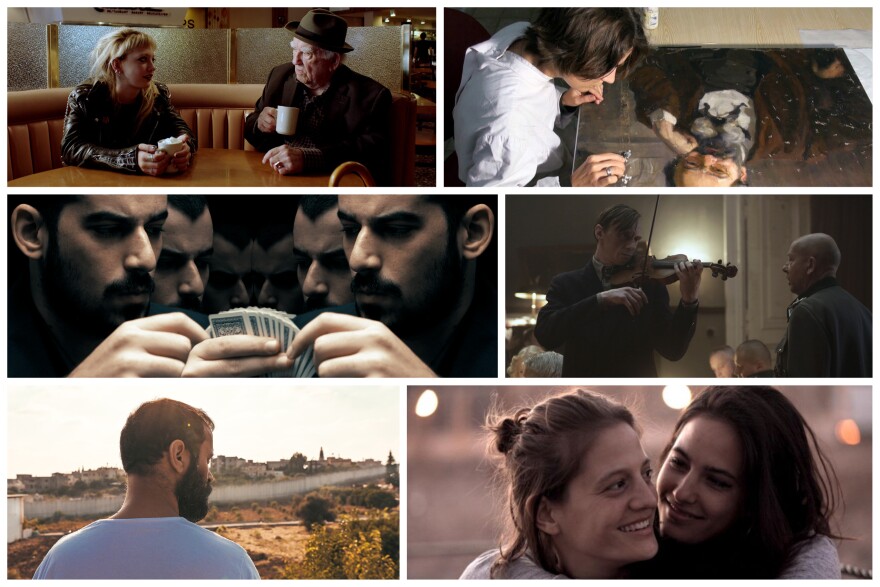From Texas Standard:
The Austin Jewish Film Festival has been highlighting films that touch on the Jewish experience for almost two decades. And while antisemitism is nothing new, the 19th annual event is happening soon after a rash of antisemitic acts across Central Texas.
David Finkel is the festival’s director. He told Texas Standard AJFF is taking place Nov. 11-16 in person and online as planned and with the usual attention to security. He also said supporting the festival is one way people can stand up against hate.
Listen to the interview above or read the transcript below.
This transcript has been edited lightly for clarity:
Texas Standard: Does the festival this year feel different, given recent high-profile examples of hate towards Jewish people.
David Finkel: Well, I prefer not to focus on the action of a few deranged people, most of whom seem to have come from out of town. [I’m] really focused on the reaction of the Austin community, and we've seen that incredible outpouring of love. A good example of this is the Austin Area Interfaith Ministries, where we had more than 500 people write letters of support for the Austin community. And members of the clergy from across the board came out to show their repudiation of those actions. And unfortunately, antisemitism is nothing new. We have films about in every year, but I don't think it defines our festival. We have a lot more than just that.
Nonetheless, is any of this causing you to change anything about your event or is it business as usual for the festival?
It's mostly business as usual. We, as a Jewish organization, always have to take certain security measures, and the recent actions unfortunately just illustrate why that's important. And the safety and comfort of our audience is always paramount, and we've done our best to ensure that again this year.
Well, let's get to the films. You're showcasing more than 50 this year. How do you choose them and do you have a couple of favorites?
We put a lot of effort this year into making sure that all of our feature films are available both in person during the festival, November 11 to 16, as well as online for 48 hours. And in fact, we have a little shtick that we're calling “oy vey, enjoy it your way,” which is our way of acknowledging the pandemic.
We have a few films that are either North American or U.S. premiere films. “Shweta Island” is a film about the conversos or crypto-Jews of the island of Mallorca. A film called “The Musicians” is a World War II drama – you asked about antisemitism. It's one where there are two musicians, and it starts off with one person who really is pretty anti-Semitic. We sort of see the price that people will pay to do the right thing to help other people. And the third one, which is a U.S. premiere, is called “Dirty Tricks,” and it's a documentary about bridge, but it's the elite area of bridge. The key protagonist, Lotan Fisher, is one of the world's top bridge players. He's playing with Warren Buffett and Bill Gate, and he gets accused of cheating and his world collapses. This is really more like a true crime drama.
I read a little bit about that, and I can't wait to check it out. Indeed, the tagline of the festival is “For Jew and you too” – it's meant to be open to everyone, and having virtual options now obviously makes that reach possibly outside of the Austin area. How central is that “you too” part of your mission when it comes to this festival?
Well over a quarter of our audience is non-Jewish, and the Jewish part of our festival is [that] the content all has something to do with Jewish character or stories or Israeli characters or stories. But I really think that the films are universal. If you look at a film about the experience during and after the second World War, it's clearly not the exact same experience that people from places like Afghanistan are going through. But there's an equivalency. And as we have large numbers of Afghan refugees coming to Austin – this is one way in which people can look at how other folks have experienced war, and survive that, and what their experiences have been.
And I think also, one of the ways to combat some of the recent actions that you were mentioning, is to come together. I think that's the serious side of what our film festival does. It creates an opportunity for people to come together, have a shared experience and then engage in conversation following that.
I was thinking that supporting a festival like yours might be one way Texans could send a statement denouncing antisemitism, certainly right now. What else would you hope Texans might do?
I think that first of all, Texans should repudiate hate of all stripes, not just anti-Jewish hate, but hate directed towards any other individual type of group. I think there are organizations that people can support. The Anti-Defamation League is certainly one that we support. But I think you're right. Coming out and supporting the Jewish community, whether it's a Jewish film festival, another cultural activity, a synagogue – you always want to make sure that if you're going to go to a synagogue, you call in advance because they want to make sure everybody stays safe.
Copyright 2021 KUT 90.5. To see more, visit KUT 90.5. 9(MDAwMTM1NDgzMDEyMzg2MDcwMzJjODJiYQ004))


